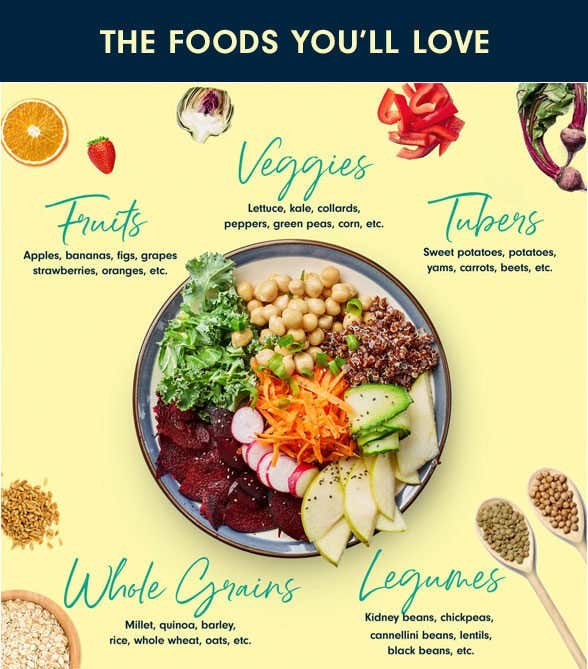Are These BBQ Sauces Really Plant-Based? We Investigated
Are These BBQ Sauces Really Plant-Based? We Investigated
Blog Article
Everything About Healthy Food: Advantages of Checking Out Plant Based Choices
The conversation bordering plant-based diets has gotten significant focus in recent years. Lots of people are exploring the possible health and wellness advantages, nutritional advantages, and environmental impacts connected with these dietary selections. As people come to be a lot more familiar with their food's impact on wellness and sustainability, concerns occur concerning the usefulness of adopting such a way of living. What certain changes can one expect, and exactly how might these options reshape not just personal wellness however additionally the world's future?
Comprehending Plant-Based Diet Plans
Although lots of people link plant-based diets mostly with vegetarianism or veganism, these diet regimens can encompass a wide range of consuming patterns that prioritize whole, minimally processed plant foods. Such diets often include fruits, veggies, whole grains, nuts, seeds, and beans, while restricting or removing animal products. This adaptability enables people to tailor their nutritional choices according to individual preferences and nutritional demands. Some may embrace a mostly plant-based diet regimen while still sometimes consuming meat or dairy products, commonly described as a flexitarian technique. The focus remains on integrating even more plant foods, which can cause a diverse array of flavors and dishes. Recognizing these various interpretations of plant-based eating is crucial for valuing its accessibility and allure in contemporary food society.
Health And Wellness Perks of Plant-Based Foods
The health benefits of plant-based foods are considerable, using a nutrient thickness advantage that supports general wellness. Research indicates that these foods can enhance heart wellness and play an essential function in reliable weight monitoring. By including extra plant-based options, people might enhance their nutritional selections and promote lasting health.
Nutrient Density Advantage
Nutrient density plays a crucial function in the health and wellness benefits of plant-based foods, making them a compelling choice for those looking for a balanced diet. Plant-based foods, such as fruits, veggies, legumes, nuts, and whole grains, are often abundant in important vitamins, minerals, and anti-oxidants while being lower in calories. This high nutrient thickness permits people to eat fewer calories while still meeting their dietary requirements. In addition, these foods are loaded with nutritional fiber, promoting gastrointestinal health and helping in weight monitoring. By integrating nutrient-dense plant-based choices, consumers can enhance their general health, support their body immune systems, and decrease the danger of chronic diseases. Inevitably, the nutrient thickness of plant-based foods underscores their importance in a health-conscious lifestyle.
Heart Health Improvement

Weight Management Support
In enhancement to promoting heart health, a plant-based diet plan can substantially assist in weight administration. This dietary approach highlights entire foods such as fruits, vegetables, legumes, nuts, and entire grains, which are generally reduced in calories and higher in fiber compared to animal-based products. The high fiber material assists boost satiety, reducing general calorie consumption. Additionally, plant-based diet plans are usually rich in crucial nutrients while reduced in harmful fats, making it easier to preserve a healthy and balanced weight. Plant Based Chicken. Study indicates that individuals that embrace a plant-based lifestyle often tend to have reduced body mass indexes (BMIs) and experience more effective fat burning compared to those who eat meat-heavy diet plans. Welcoming plant-based options is a strategic option for effective weight monitoring.
Nutritional Worth of Plant-Based Active Ingredients
Plant-based ingredients are abundant in necessary nutrients, using a diverse range of vitamins, minerals, and anti-oxidants that contribute to general wellness. A contrast of healthy protein resources exposes that while animal products are frequently deemed exceptional, numerous plant-based alternatives supply ample protein and various other useful substances. Understanding the nutritional value of these ingredients can assist people make informed nutritional options.
Essential Nutrients in Plants
Nutrient-rich active ingredients located in plants supply a varied selection of crucial minerals and vitamins that add considerably to general wellness. These components are abundant in vitamins A, C, and K, which sustain immune function, vision, and blood clot, specifically. Additionally, plants give essential minerals such as potassium, magnesium, and calcium, crucial for heart wellness, muscular tissue function, and bone toughness. The visibility of fiber in plant-based foods aids digestion and advertises a healthy gut microbiome. Anti-oxidants, found generously in veggies and fruits, assistance combat oxidative stress and decrease swelling. In addition, several plant foods are low in calories yet high in nutrients, making them an exceptional choice for those looking for to maintain a healthy weight while ensuring optimal nutrient intake.
Contrasting Healthy Protein Sources
Protein resources differ substantially in their dietary accounts, with plant-based ingredients using one-of-a-kind advantages. Unlike pet healthy proteins, which typically contain saturated fats and cholesterol, plant healthy proteins tend to be lower in these harmful parts. Legumes, nuts, seeds, and entire grains are abundant in important amino acids, fiber, vitamins, and minerals. As an example, lentils supply high healthy protein content along with considerable iron and folate, while quinoa is a total protein, using all nine important amino acids. In addition, plant-based healthy proteins are commonly gone along with by antioxidants and phytochemicals that sustain general health. The change to plant-based protein sources not only improves nutritional consumption however likewise aligns with sustainable nutritional practices, lowering environmental impact and advertising lasting wellness benefits.
Ecological Impact of Plant-Based Consuming
As recognition wikipedia reference of climate adjustment grows, numerous people are discovering sustainable dietary choices that can substantially lessen their environmental footprint. Plant-based consuming has actually become a substantial factor to lowering greenhouse gas exhausts, which are largely linked with animals manufacturing. The farming of fruits, grains, vegetables, and vegetables normally requires fewer sources, such as water and land, contrasted to pet farming. Additionally, plant-based diets can lead to lowered logging, as much less land is required for grazing animals or growing pet feed. By changing in the direction of plant-based alternatives, consumers can sustain biodiversity and advertise much healthier communities. In general, accepting plant-based consuming not just advantages personal wellness however likewise represents an essential step towards environmental sustainability and preservation efforts.
Overcoming Common Misconceptions
While lots of individuals recognize the advantages of a plant-based diet regimen, numerous mistaken beliefs frequently prevent them from fully embracing this way of living. A typical belief is that plant-based diet plans lack enough protein; however, many plant resources, such as legumes, nuts, and tofu, supply sufficient healthy protein. Additionally, some think that this diet regimen is costly, when in reality, staples like beans, rice, and seasonal why not check here vegetables can be rather inexpensive. Another misconception is that plant-based eating is overly limiting, whereas it in fact uses a diverse array of foods and tastes. Ultimately, several fret that a plant-based diet may cause shortages, yet with correct planning, individuals can obtain all essential nutrients, including minerals and vitamins, while appreciating a large range of scrumptious meals.
Tips for Transitioning to a Plant-Based Way of living
Making the shift to a plant-based way of life can be an improving experience, though it frequently requires some support to browse the first adjustments. Individuals are encouraged to begin slowly, integrating even more fruits, vegetables, vegetables, and whole grains into their dishes while minimizing meat and milk usage. Meal preparation is necessary; preparing a regular menu can help ease the adjustment and stop last-minute unhealthy choices. Checking out new dishes and cooking methods can also preserve and boost the experience excitement concerning plant-based consuming. Furthermore, signing up with support teams or communities can provide motivation and share valuable tips. Remaining informed regarding nutrition warranties well balanced meals, stopping deficiencies while cultivating a healthy, enjoyable plant-based way of life.

Delicious Plant-Based Meal Concepts
Exploring delicious plant-based dish ideas can motivate individuals to accept a much more healthy diet plan. One preferred alternative is a passionate quinoa salad, including cherry tomatoes, cucumber, and a vibrant lemon-tahini dressing. One more fave is a full-flavored lentil stew, packed with carrots, celery, and fragrant natural herbs, best for a soothing supper. For breakfast, over night oats made with almond milk, chia seeds, and covered with fresh berries give a healthy begin to the day. Additionally, a dynamic vegetable stir-fry with tofu and a range of vivid veggies can be a fast yet satisfying dish. Ultimately, creamy avocado salute on whole-grain bread, sprayed with seeds and flavors, provides a straightforward why not try these out yet savory treat. These dishes display the range and richness of plant-based eating.

Regularly Asked Inquiries
Can a Plant-Based Diet Plan Offer Enough Protein?
The concern of whether a plant-based diet can offer sufficient healthy protein prevails. Many resources, consisting of legumes, nuts, seeds, and entire grains, can meet protein requires successfully, sustaining a healthy and balanced diet regimen for people.
Are Plant-Based Diet Plans Suitable for Kid?
The viability of plant-based diets for children relies on careful planning. Adequate nutrients have to be ensured, consisting of minerals, healthy proteins, and vitamins. With correct assistance, such diet regimens can sustain healthy growth and development in kids.
How Do I Eat in restaurants on a Plant-Based Diet plan?
Eating in restaurants on a plant-based diet regimen involves looking for dining establishments with diverse menus, requesting for alterations, and exploring vegan-friendly choices. Preparation in advance and communicating dietary preferences can improve the eating experience while preserving nutritional options.
What Are Common Irritants in Plant-Based Foods?
Common allergens in plant-based foods consist of soy, gluten, nuts, and seeds - BBQ Sauces. People complying with a plant-based diet plan should know these irritants and check out tags thoroughly to prevent unfavorable reactions and assure safe intake
Can Plant-Based Diets Aid With Weight Reduction?
Study indicates that embracing a plant-based diet plan might promote fat burning due to its typically lower calorie thickness and greater fiber web content. This combination can enhance satiety, aiding people manage their calorie intake properly. Lots of individuals associate plant-based diet plans generally with vegetarianism or veganism, these diet regimens can incorporate a wide variety of eating patterns that prioritize whole, minimally processed plant foods. Nutrient density plays an essential role in the wellness benefits of plant-based foods, making them an engaging option for those looking for a balanced diet. Plant-based diets have been revealed to substantially boost heart health, as they typically have components that sustain cardiovascular function. In enhancement to advertising heart health, a plant-based diet plan can substantially help in weight administration. A common idea is that plant-based diet plans lack sufficient protein; however, countless plant resources, such as legumes, nuts, and tofu, give sufficient healthy protein.
Report this page